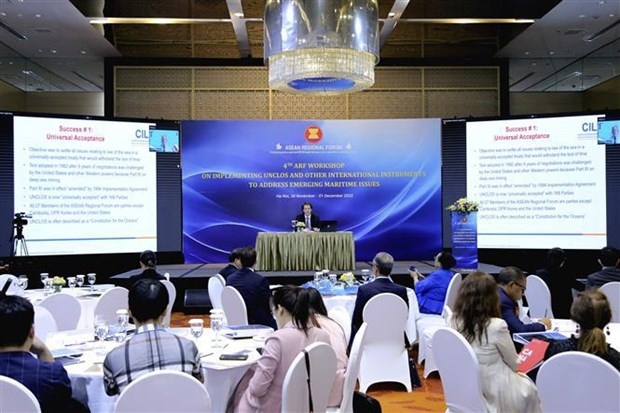1982 UNCLOS highlighted as important legal tool for preserving regional peace
VOV.VN -Realising the 1982 UN Convention on the Law of the Sea (1982 UNCLOS) and other international instruments aimed at dealing with emerging maritime issues has been the focus of a workshop held on November 30 and December 1 in Hanoi.

The hybrid ASEAN Regional Forum (ARF) workshop has been co-organised by the Vietnamese Ministry of Foreign Affairs, the EU, Australia, and New Zealand, with the event bringing together about 200 representatives from 27 ARF member countries. This is in addition to both regional and international organisations, diplomatic offices, research institutes, ministries, and agencies.
In his opening remarks at the function, Nguyen Minh Vu, assistant to the Minister of Foreign Affairs, reiterated the significance of the 1982 UNCLOS, especially in terms of facing emerging challenges to the settlement of maritime issues which requires intensive and extensive international co-operation.
The 1982 UNCLOS therefore serves as an important basis for countries in the region to consolidate trust and build ties, for the cause of peace, security, and prosperity, he stressed. Vu added that all disputes and maritime issues should be addressed by peaceful means in line with international law, including the Convention.
Vu noted that the workshop can be viewed as a demonstration of regional commitment to international co-operation as part of efforts cope with these challenges.
Thomas Wiersing, deputy head of the EU Delegation to Vietnam, emphasised the leading role of ASEAN in promoting peace and stability in the region, affirming the bloc’s support for the early completion of a substantive and legally-binding Code of Conduct (COC) in the East Sea.
Mark Tattersall, Chargé d'affaires of the Australian Embassy in Hanoi, hailed the ARF’s role in security and cooperation dialogues in the Indo-Pacific region.
Delegates shared the view that the 1982 UNCLOS represents the most crucial legal tool in maintaining peace and stability throughout the region, creating a framework to push ahead with the settlement of both traditional and emerging maritime issues in the region.
